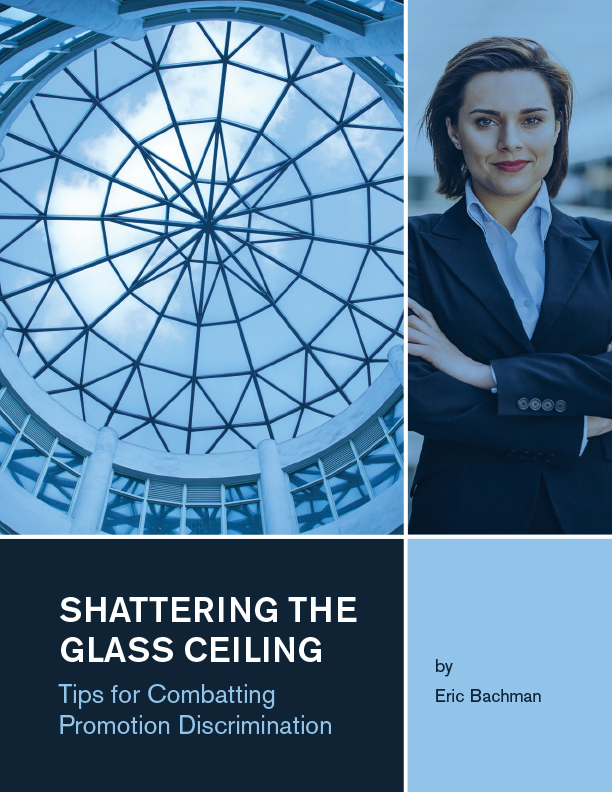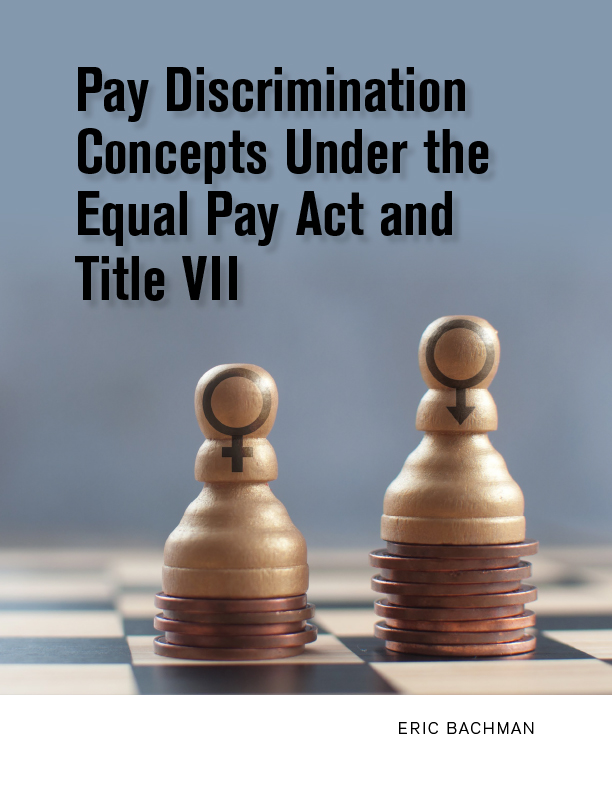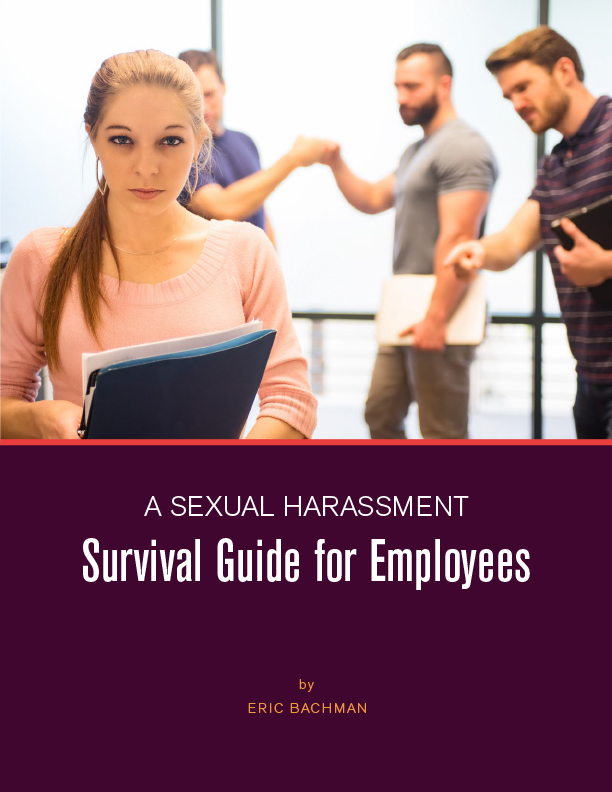Gender Discrimination & Glass Ceiling Discrimination
What laws apply in employment gender discrimination cases?
A variety of federal anti-discrimination laws apply in a sex/gender discrimination case. These laws include Title VII of the 1964 Civil Rights Act, the Equal Pay Act, and the Pregnancy Discrimination Act. Similarly, a host of state and local laws also prohibit sex/gender discrimination in employment. Talk with an experienced gender discrimination lawyer to explore your legal options.
How do I prove gender discrimination at work?
To establish a prima facie case of gender discrimination based on intentional discrimination an employee must show that they:
- are a member of a protected class,
- suffered an adverse employment action,
- met their employer’s legitimate expectations at the time of the adverse employment action, and
- were treated differently from similarly situated employees outside their protected class.
If these elements are met then the employer must articulate a non-discriminatory reason for the adverse employment action. If an employer does so, then the employee has to prove by a preponderance of the evidence that the employer’s articulated reason is a mere pretext/ excuse for discrimination.
It is important to consult with an experienced gender discrimination lawyer to understand your legal options.
What remedies are available in gender discrimination cases?
- Back pay damages for wages lost due to the harassment
- Emotional distress damages (also referred to as compensatory damages)
- Punitive damages designed to punish the employer for especially reckless or malicious harassment
- Reasonable attorney’s fees
What is Glass Ceiling Discrimination?
A glass ceiling generally refers to an unfair, artificial barrier that prevents certain employees (women; people of color; LGBT) from fairly competing for upper management jobs in companies. In practice, it keeps qualified employees from reaching their full potential and, depending on applicable law, illegally blocks them from occupying the best-paid and most powerful positions. The glass ceiling can be caused by, among other things:
- entrenched attitudes/stereotypes about what type(s) of people should get the “top” jobs at the company;
- subjective/hard to define qualifications for promotions that introduce conscious or unconscious biases into decision-making; and/or
- a lack of networking and mentoring opportunities for women, people of color, and LGTB individuals.
Title VII of the 1964 Civil Rights Act, as well as other federal and state laws, make it illegal for an employer to use promotion practices that create a glass ceiling.
What can I do if my employer denied me a promotion because of my gender?
Several different legal options exist, including:
- Filing an internal complaint with your company;
- Documenting evidence of discrimination;
- Exploring different anti-discrimination laws that may apply to your claim;
- Understanding the applicable deadlines, including EEOC discrimination charge filing deadlines, that may apply;
- Reaching out to your company prior to filing a formal charge of discrimination or lawsuit to discuss settlement; and/or
- Filing a complaint in court.
Bachman Law routinely handles gender discrimination and glass ceiling cases on behalf of executives. Our free e-book lays out helpful information in an easy-to-follow format.
Shattering-the-Glass-CeilingWhat is the Equal Pay Act?
Congress first passed the Equal Pay Act (EPA) in 1963, and it “prohibits employers from discriminating among employees on the basis of sex by paying higher wages to employees of the opposite sex for ‘equal work on jobs the performance of which requires equal skill, effort, and responsibility, and which are performed under similar working conditions.’” Belfi v. Prendergast, 191 F.3d 129, 135 (2d Cir. 1999) (quoting 29 U.S.C. § 206(d)(1)).
“The median salary for women working full-time is about 80 percent of men’s,” the Washington Post reported in a fascinating, in-depth analysis of the gender wage gap. “That gap, put in other terms, means women are working for free 10 weeks a year.” Put another way, the average employer stops paying female employees in October of each year, after which, the female employee is theoretically working for free.
Variations of course exist on the wage gap across jobs and industries, and not all women receive even 80% of a man’s pay. African-American women, for example, earn $0.61 cents to every dollar white men earn.
How do I win an Equal Pay Act case?
To establish a prima facie case under the Equal Pay Act, the plaintiff must show that:
1. she was “doing substantially equal work on the job, the performance of which required substantially equal skill, effort, and responsibility as the jobs held by members of the opposite sex”;
2. “the job was performed under similar working conditions”; and
3. she was “paid at a lower wage than members of the opposite sex.”
Cornish v. District of Columbia, 67 F. Supp. 3d 345, 360-61 (D.D.C. 2014) (citations omitted).
Once the EPA claimant has met that burden, the employer has the burden of demonstrating the applicability of one of the four affirmative defenses identified in the EPA:
1. a bona fide seniority system,
2. a merit system,
3. a system which measures earnings by quantity or quality of production, or
4. a differential based on any factor other than sex. See 29 U.S.C. § 206(d)(1).
How does the Equal Pay Act relate to Title VII?
If you have an Equal Pay Act claim, you thus may also have a claim under Title VII of the Civil Rights Act of 1964 (“Title VII”). Title VII prohibits discrimination in compensation and other terms and conditions of employment, so it is broader than the EPA. Title VII also prohibits discrimination in compensation or other aspects of employment based on race, color, religion, or national origin.
What are the major differences between the Equal Pay Act and Title VII?
Although Title VII and the EPA have many similarities, they also have notable distinctions that may affect your potential lawsuit (all of the points below assume the claim is against a private employer):
• Under the EPA, you are not required to file an EEOC Charge of Discrimination before going to court, but you must file a charge for a Title VII pay discrimination claim;
• Unlike the EPA, no requirement exists under Title VII to prove that your job is substantially equal to that of a higher-paid male employee, nor under Title VII must you work in the same establishment as the male comparator;
• In an EPA claim, your employer will have to meet a more demanding burden of proof (not just a burden of production like in a Title VII claim) to establish its EPA defense (seniority system, merit system, production-quota system, or any factor other than sex);
• If you prove your employer willfully violated the EPA, you may receive liquidated damages;
• Title VII’s anti-discrimination provisions cover more protected characteristics (race, gender, religion, etc.) than the EPA, which is limited to gender-based differences.
For more information, see our Frequently Asked Questions (FAQs) page that answers many common questions in plain English.
Consult with a gender discrimination lawyer to maximize your potential damages. If you have experienced workplace discrimination or whistleblower retaliation, call us at (202) 769-1681, or start your preliminary consultation online.

Ebooks

Shattering the Glass Ceiling: Tips for Combatting Promotion Discrimination

Pay Discrimination Concepts Under the Equal Pay Act and Title VII

A Sexual Harassment Survival Guide for Employees
Latest From The Glass Ceiling Discrimination Blog

Eric Bachman named a Top Lawyer for whistleblowers by Washingtonian Magazine
Washingtonian magazine again named Bachman Law founder Eric Bachman a Top Lawyer in Whistleblower Law in its 2024 Top Lawyers’ edition. Washingtonian compiles its list

Federal court issues key decision in class action race discrimination case against Maryland State Police
This week the federal court in Maryland issued a key ruling in the class action race discrimination case against the Maryland State Police (MSP) that

Bachman Law named to 2025 Best Lawyers list
Bachman Law principal Eric Bachman was again named to the 2025 Best Lawyers in America in the fields of Employment Law/Civil Rights. Bachman has been named